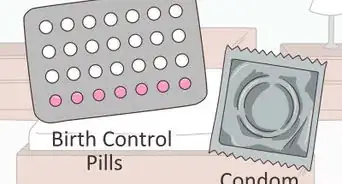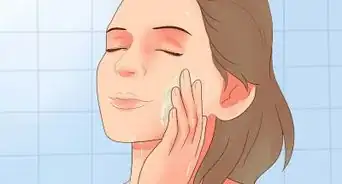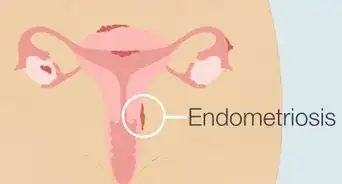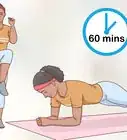This article was co-authored by Tracey Rogers, MA. Tracey L. Rogers is a Certified Life Coach and Professional Astrologer based in Philadelphia. Tracey has over 10 years of life coaching and astrology experience. Her work has been featured on nationally syndicated radio, as well as online platforms such as Oprah.com. She is certified as a Coach by the Life Purpose Institute, and she has an MA in International Education from George Washington University.
There are 27 references cited in this article, which can be found at the bottom of the page.
This article has been viewed 56,143 times.
Being a teenager is difficult. You may have to grapple with a lot of obligations. You may be struggling to establish a good foundation for adulthood. To get your life on track, and to establish good habits for adulthood, learn to be healthy and happy in both your body and mind.
Steps
Having a Healthy Mind
-
1Cultivate a positive self image. Being positive about the way you look or how you come across can be very difficult. It is something that a number of people struggle with their entire life. By starting good habits during your teenage years, you can help establish positive habits throughout your life.[1]
- Be proud of what you can do! Think about what you have accomplished in your life thus far. This could be anything - how strong you are, how smart you are, how far you’ve come.
- Develop a routine to cope with low self esteem. If you start to recognize yourself feeling bad about yourself, do something you enjoy: listen to music, take a walk, or write in a journal. This is not intended to distract you from your low self-esteem, but help you feel positive about the things you enjoy about life.
- Focus on the good things. If you struggle with your self-image, try making a list of things you enjoy. This will help you redirect your thoughts into a more positive light. For example, if you are worried about the physical state of your thighs, think about the strength you have in your body.
- If you feel down most of the time and can not seem to get yourself out of it, you may want to consider talking to your doctor. There may be a medical reason behind these feelings. [2]
-
2Know your limits. Your teenage years are very busy between social and education obligations. You are also expected to prepare for your future. Start to recognize your limits now, so you do not stress yourself out and can help build a good foundation for your future.
- Avoid alcohol, drugs, and gambling. You need to be in total control of your faculties in order to focus on your busy life. These activities can be habit forming, and can negatively affect your future. If you struggle with any of these addictions, talk to a trusted adult or your doctor.
- Be financially smart. The world is an expensive place. Learn to spend responsibly by setting a budget. Being responsible about your money can help you afford important purchases in the future and help you for future emergencies.
Advertisement -
3Talk to your parents. Your parents are there to help you with the tools you need to grow up into a healthy, happy adult. Talk to them with any problems or concerns that you have. It’s hard to ponder, but they were once teenagers as well![3]
- Write down your concerns. Sometimes it’s difficult to talk about subjects that might be difficult to voice or may be too embarrassing. You may be afraid to get in trouble. Try writing a letter with your concerns before you present them.
- Practice what you want to say before you say it. Before you talk to your parents, try practicing what you want to say. Try things like: “Mom, Dad, I have something important to talk about. Do you have a few minutes?” or “Dad, I’m having trouble setting a budget. Can you show me how you do it?”
Maintaining a Healthy Outlook
-
1Stay positive. Traits like sympathy, empathy, and kindness are great traits to cultivate and take with you into adulthood. Practice these good habits and stay positive.[4]
- Say daily affirmations. Look in the mirror every day and say something positive about yourself or your day. Something like: “I am strong. I will handle each problem as it comes. I will take care of myself today.”
- Do something nice for someone. Offer to carry groceries for someone who looks like they need it. Help a classmate carry their books. You never know when someone needs a bit of kindness or is having a bad day!
-
2Make good decisions. Making good decisions can be very difficult. It takes bravery and a solid will.[5] Learning to make good decisions can be difficult, but is an essential skill to survive. Think about the “C’s to good decision making,” offered by the Advocates For Youth organization:
- Challenge -- What challenge are you facing? What makes it a difficult decision to answer? Example: I am facing peer pressure from my friends and my boyfriend to have sex when I am not sure I am ready.
- Choices you have -- Write down the choices that you can make. This will help you logically think through your options. What can you do? What can you control? What is out of your control? Example: I can have sex. I can not have sex.
- Consequences of each choice -- What are the positive outcomes of your choices? What is the potential negative outcomes? Example: If I have sex, my friends and boyfriend would be happy but I will not be. If I don’t have sex, my friends may laugh at me and my boyfriend may breakup with me. But, I will be happy with myself and feel more confident about being able to stand up for myself.
-
3Be your own advocate. Know that you have rights as a teenager and that you can start to make important life decisions on your own. If you feel you are being abused at home or school, know there are resources out there to help you.
-
4Advocate for others. If you are lucky enough to have a healthy and happy home, there are plenty of things you can do to give to other teenagers or organizations in need. Pick an organization or cause that you believe in, and volunteer!
- Advocate for teen health. Teenagers all around the world do not have access to health services. Join the fight to make sure everyone has adequate health coverage. [12]
- Advocate for world peace. If you want to make the world a peaceful place for your generation and the next, join a group that advocates peace. [13]
Cultivating and Maintaining Healthy Relationships
-
1Make your own decisions about sex. You are in control of your own body. No one else can make the decision to have sex other than you. You can decide when, where, and with whom to have sex. Learn to:
- Talk to your doctor about safe sex. Doctors are professionally trained to help patients with all kinds of medical things. This includes how to engage in sex safely. They can talk to you about forms of birth control -- like oral contraceptives or condoms. They can talk to you about how to get tested for STDs and STIs.
- Practice safe sex. If you feel you are ready to have sex with a partner, practice safe sex by using a contraceptive and knowing the risks. Using proper contraception practices will help reduce the risk of unintended pregnancy and sexually transmitted diseases (STDs) or sexually transmitted infections (STIs).
- Only engage in sex when you are ready.
- Say no to sex if you do not feel you are ready. You should have control over your own decision.
-
2Stand up to peer pressure. Your peers -- the people you see, work, learn with -- may pressure you to make decisions that you may not be ready to do. Try and avoid people who try and pressure you into making decisions you are not comfortable with. Hang out with people who encourage you to make positive decisions about your life.
-
3Cultivate healthy friendships. Having a good support network is important! You want to hang out with people who bring out the best in you and help you make good decisions.
- Be yourself. You want to be around people who respect you.
- Be a good listener. A friendship is a two-way street. You want to be there and listen to your friends for their triumphs and defeats.[14]
- Try and meet people who embody the traits you want to have. If there is someone you know who goes out of their way to help others, try and strike up a conversation with them. Let them know that you respect their actions and want to learn from them.
Managing Your Time Wisely
-
1Practice good study habits. This includes learning to take good notes and learning to study them.
- Take good notes. There are many great note-taking strategies to help you become a good student. One such strategy is the Cornell Note taking Method
- To use this method, divide a standard 8 x 11 inch paper into three parts:
- A 2 ½” cue column on the left-hand side of the paper. This will hold vocabulary words, key terms, and possible test questions.
- A 6” note taking column to take up the rest of the vertical space of the paper. You will take your daily notes here. It is a good idea to write your notes out in an alphanumeric outline format.
- A 2” horizontal row at the bottom of your paper to summarize the day’s notes.
-
2Cultivate good relationships with your teachers and mentors. Your teachers can help you in a number of ways. It is good to be kind and respectful to them so that you can benefit from their mentorship.[15]
- They can help you with college admissions, both filling out forms and writing letters of recommendation.
- They can more easily identify any weaknesses you have in your education.
- They can help you study more effectively.
- They can help you find resources if you have struggles outside of the classroom.
-
3Avoid over-committing your time. Life can get very busy! It is very easy to agree to take on projects, say yes to parties, or overfill your days. Time management is an important part of everyone’s life.[16]
- Learn to say no politely. It’s okay to say no to obligations if you have too many things to do. Try saying: “No thanks, I’m not going out tonight. I really need to study for tomorrow’s Chemistry test” or “I’d really love to work on this project, but I have a lot going on right now.”
- Make a schedule and stick to it. Use a planner or a calendar and write down your obligations. Having this written down will give you visual cues to help you identify your obligations.
- Be sure to take time for yourself. It’s really easy to take on too many projects. Remember to take a few hours a day just to relax or unwind.
Having a Healthy Body
-
1Stay hydrated.[17] Drinking enough water helps your brain stay awake and alert. It also helps your skin stay moist and healthy and is also essential to your physical health.
- Health professionals recommend drinking 8-10 cups of water a day for people 13 years or older.
- You should drink more water if it is a hot day or you’ve been exercising.
-
2Sleep. The National Sleep Foundation recommends that a teenager (13-18 years old) gets 9 ½ hours of sleep per night![18] Sleep affects a number of functions, so rest well to be your best.
- A lack sleep can negatively impact your mood or behavior.
- A lack of sleep can negatively impact your study and/or school routine.
- Teenagers are at the highest risk for falling asleep at the wheel. This can hurt you and your friends.[19]
-
3
-
4Visit your doctor regularly. Your body is going through rapid changes in physical, mental, and hormonal ways.[22] You are the best person to monitor how your own body feels, but you should talk to your doctor on a frequent basis to make sure that you are growing up to be healthy and happy.
- You should meet with your doctor on a yearly basis for basic health screenings such as obesity, diabetes, blood pressure, thyroid function, depression, etc.
-
5Eat right.[23] Eating a balanced diet of a variety of vegetables, fruits, carbs, and proteins will help you have a healthy body. Your daily calorie requirements will vary depending on your sex, age, and activity level.[24] To eat healthy, the NIH suggests:
- When eating away from home, choose a smaller portion. This will help you avoid overeating.
- Moderate the amount of junk food and/or fast food you consume.
- Try to eat high energy foods such as fruits, vegetable, and whole grains.[25] [26]
- Learn to read nutrition labels.[27] This can help you learn to identify what is in the food you eat, how many calories are in a serving size, and how the food meets your daily nutritional requirements.
Expert Q&A
-
QuestionHow do I find my next step in life?
 Tracey Rogers, MATracey L. Rogers is a Certified Life Coach and Professional Astrologer based in Philadelphia. Tracey has over 10 years of life coaching and astrology experience. Her work has been featured on nationally syndicated radio, as well as online platforms such as Oprah.com. She is certified as a Coach by the Life Purpose Institute, and she has an MA in International Education from George Washington University.
Tracey Rogers, MATracey L. Rogers is a Certified Life Coach and Professional Astrologer based in Philadelphia. Tracey has over 10 years of life coaching and astrology experience. Her work has been featured on nationally syndicated radio, as well as online platforms such as Oprah.com. She is certified as a Coach by the Life Purpose Institute, and she has an MA in International Education from George Washington University.
Certified Life Coach Reflect on your past experiences over the course of the last year. Identify where you struggled, where you succeeded, and where you'd like to improve. Then, figure out what you want to achieve most in the next couple of months. This will help you establish a concrete next step.
Reflect on your past experiences over the course of the last year. Identify where you struggled, where you succeeded, and where you'd like to improve. Then, figure out what you want to achieve most in the next couple of months. This will help you establish a concrete next step.
References
- ↑ http://www.ncbi.nlm.nih.gov/pmc/articles/PMC2914631/
- ↑ http://youngwomenshealth.org/2012/05/30/self-esteem/
- ↑ Tracey Rogers, MA. Certified Life Coach. Expert Interview. 6 January 2020.
- ↑ http://supportseekers.info/developing-positive-thinking-in-teenagers/
- ↑ https://www.advocatesforyouth.org/wp-content/uploads/storage//advfy/documents/chapter8.pdf
- ↑ https://www.plannedparenthood.org/
- ↑ https://www.google.com/search?q=teenage+sexual+health+UK&rlz=1CAACAJ_enUS659US659&oq=teenage+sexual+health+UK&aqs=chrome..69i57j0l2.4571j0j4&sourceid=chrome&es_sm=0&ie=UTF-8
- ↑ http://www.suicidepreventionlifeline.org/
- ↑ http://www.suicide.org/hotlines/international/united-kingdom-suicide-hotlines.html
- ↑ https://www.lifeline.org.au/
- ↑ http://kidshealth.org/teen/your_mind/families/family_abuse.html
- ↑ http://www.advocatesforyouth.org/
- ↑ http://worldrelief.org/advocate
- ↑ http://www.loveisrespect.org/healthy-relationships/
- ↑ http://www.usnews.com/education/blogs/college-admissions-playbook/2015/02/02/4-reasons-high-schoolers-should-build-strong-teacher-relationships
- ↑ https://hbr.org/2015/02/a-formula-to-stop-you-from-overcommitting-your-time
- ↑ https://www.healthykids.nsw.gov.au/kids-teens/choose-water-as-a-drink-kids.aspx
- ↑ www.nationwidechildrens.org/sleep-in-adolescents
- ↑ http://www.nationwidechildrens.org/sleep-in-adolescents
- ↑ http://www.choosemyplate.gov/sites/default/files/tentips/DGTipsheet36EatSmartAndBeActiveAsYouGrow.pdf
- ↑ https://www.fueluptoplay60.com/
- ↑ http://kidshealth.org/parent/system/doctor/medical_care_13_18.html
- ↑ http://www.choosemyplate.gov/teens
- ↑ http://www.niddk.nih.gov/health-information/health-topics/weight-control/take-charge-your-health/Pages/take-charge-your-health.aspx#c
- ↑ http://www.cdc.gov/nccdphp/dnpa/nutrition/pdf/r2p_energy_density.pdf
- ↑ http://www.niddk.nih.gov/health-information/health-topics/weight-control/take-charge-your-health/Pages/take-charge-your-health.aspx
- ↑ http://www.niddk.nih.gov/health-information/health-topics/weight-control/take-charge-your-health/Pages/take-charge-your-health.aspx#numbers
-Step-1-Version-2.webp)
-Step-2-Version-3.webp)
-Step-3-Version-3.webp)

-Step-4-Version-3.webp)
-Step-5-Version-3.webp)
-Step-6-Version-3.webp)
-Step-7-Version-3.webp)
-Step-8-Version-3.webp)
-Step-9-Version-3.webp)
-Step-10-Version-5.webp)
-Step-11-Version-4.webp)
-Step-12-Version-5.webp)
-Step-13-Version-3.webp)
-Step-14-Version-4.webp)
-Step-15-Version-4.webp)
-Step-16-Version-4.webp)
-Step-17-Version-4.webp)
-Step-18-Version-4.webp)


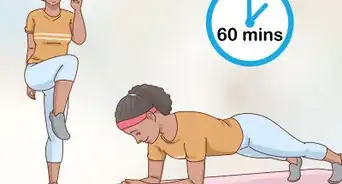


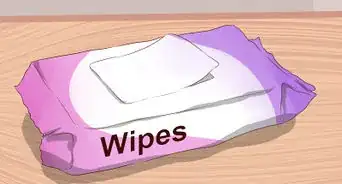
-Step-21.webp)

